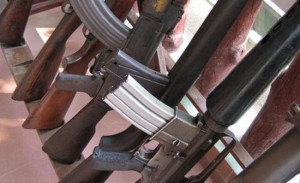 Jihadists are moving from Iraq to Syria, as are weapons being sent to opponents of Syrian President Bashar al-Assad’s regime, Iraq’s deputy interior minister told AFP on Saturday.
Jihadists are moving from Iraq to Syria, as are weapons being sent to opponents of Syrian President Bashar al-Assad’s regime, Iraq’s deputy interior minister told AFP on Saturday.
Assad has been attempting to crush an uprising against his rule since March 2011, and thousands of people have been killed.
“We have intelligence information that a number of Iraqi jihadists went to Syria,” Adnan al-Assadi said in an interview with AFP, adding that “weapons smuggling is still ongoing” from Iraq to Syria.
“The weapons are transported from Baghdad to Nineveh (province), and the prices of weapons in Mosul (the province’s capital) are higher now because they are being sent to the opposition in Syria,” Assadi said.
He said that the price of a Kalashnikov assault rifle has risen from between $100 and $200 to between $1000 and $1500.
“The weapons are being smuggled from Mosul through the Rabia crossing to Syria, as members of the same families live on both sides of the border,” he said.
And “there is some smuggling through a crossing near Abu Kamal,” he said, referring to a Syrian city.
Accoridng to McClatchy Newspaper, the Iraqi branch of al-Qaeda carried out two recent bombings in Damascus and was likely behind suicide bombings Friday that killed at least 28 people in the Syrian city of Aleppo. McClatchy cited unnamed U.S. officials as saying.
Recognition imminent for opposition
Meanwhile, Arab recognition of the opposition Syrian National Council is imminent, SNC member Ahmed Ramadan said in Qatar on Saturday, ahead of key talks in the Egyptian capital on the crisis.
“We have confirmations of an Arab recognition (of the SNC) that will soon take place, though not necessarily on Sunday,” when the Arab League holds a ministerial meeting on Syria in Cairo, Ahmed Ramadan told AFP.
“But there will be strong signals on Sunday, especially from Gulf Cooperation Council states,” whose foreign ministers will also meet in Cairo before joining the Arab League meeting, Ramadan said.
Ramadan’s comments come a day after two other SNC figures said they expected recognition of their coalition of major opposition parties, grouping Islamists ̶ including the Muslim Brotherhood ̶ liberals and nationalists.
On Friday, Imad Hussari, a spokesman for the group and leader of the “Local Coordination Committees” which mobilizes protests inside Syria, said “there should be an official recognition of the SNC by several Gulf countries.”
Another SNC figure, Istanbul-based Khaled Khoja, confirmed he expects recognition “by several Arab states in the coming days.”
The opposition members did not specify the extent of recognition they expected from Arab states.
Currently, only Libya’s post-revolutionary interim government recognizes the SNC and does so as its sole legitimate Syrian interlocutor.
The Gulf states decided on Monday to expel Syrian ambassadors from their capitals and have said they are mulling further moves.
Since arriving on Thursday, members of the SNC executive committee have held a series of meetings in Qatar, a key member of the GCC, which also groups Bahrain, Kuwait, Oman, Saudi Arabia and the United Arab Emirates.
Qatar has been at the forefront of efforts to impose sanctions against the Syrian regime’s lethal crackdown on anti-regime protesters in which activists say more than 6,000 people have been killed since March last year.
On Saturday, four SNC members travelled to Cairo to discuss with Arab League chief Nabil al-Arabia a French proposal to form a “Friends of Syria” group, Ramadan said.
French President Nicolas Sarkozy proposed creating the group after Moscow and China vetoed on February 4 a draft U.N. Security Council resolution condemning the crackdown by Assad’s forces.
Saudi King Abdullah said on Friday that world confidence in the United Nations had been shaken after the world body failed to adopt the resolution.
“We all used to take pride in the United Nations which used to bring us together and not divide us … but what took place does not augur well as world confidence in the United Nations has undoubtedly been shaken,” he said.
On Tuesday, the GCC states decided to expel Syrian envoys and withdraw their own over the “mass slaughter” of civilians.
Ramadan had said that the opposition will “begin documenting the regime’s crimes, in cooperation with international human rights groups, and will present these (documents) to the International Criminal Court.”
Al Arabiya

Leave a Reply
You must be logged in to post a comment.